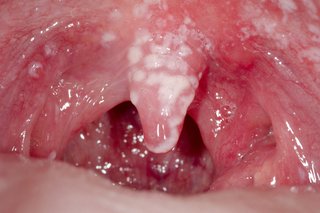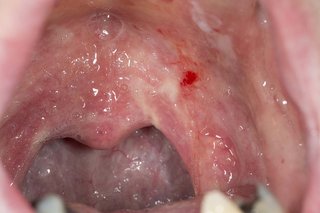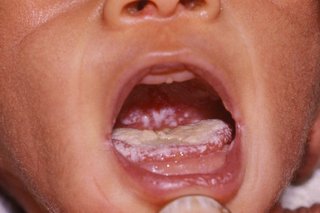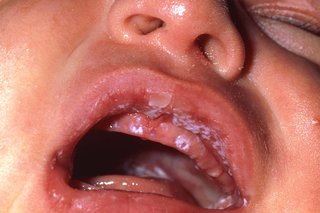Oral thrush is usually harmless. It's common in babies and older people with dentures. It can be easily treated with medicines bought from a pharmacy.
Check if it's oral thrush
Adults

DR P. MARAZZI/SCIENCE PHOTO LIBRARY

DR P. MARAZZI/SCIENCE PHOTO LIBRARY
Other symptoms in adults are:
- cracks at the corners of the mouth
- not tasting things properly
- an unpleasant taste in the mouth
- pain inside the mouth (for example, a sore tongue or sore gums)
- difficulty eating and drinking
Oral thrush in adults is not contagious.
Babies

DR M.A. ANSARY/SCIENCE PHOTO LIBRARY

DR P. MARAZZI / SCIENCE PHOTO LIBRARY
Other symptoms in babies are:
- they do not want to feed
- nappy rash
Babies can pass oral thrush on through breastfeeding. This can cause nipple thrush in mothers.
If you're not sure it's oral thrush
Look at other causes of a white or sore tongue.
A pharmacist can help with oral thrush
Oral thrush can be easily treated with a mouth gel bought from a pharmacy. Treatment usually lasts at least 7 days.
Ask your pharmacist for advice. Always follow the instructions on the medicine packet.
If you leave oral thrush untreated, the infection can spread to other parts of the body.
Non-urgent advice: See a GP if:
- your baby is under 4 months and has signs of oral thrush
- you do not see any improvement after 1 week of treatment with a mouth gel
- you have difficulty or pain swallowing
How you can prevent oral thrush
Thrush is an infection caused by a fungus called Candida. Some things can make the fungus grow more than usual.
You might get thrush if you're:
- taking antibiotics over a long time
- using asthma inhalers
- getting cancer treatment like chemotherapy
There are some things you can do to help prevent oral thrush:
Do
- take care of your teeth: brush twice a day, clean your dentures, and go for regular check-ups even if you have dentures
- brush your gums and tongue with a soft toothbrush if you do not have any teeth
- sterilise dummies regularly
- sterilise bottles after each use
- rinse your mouth after eating or taking medicine
- go to regular check-ups if you have a long-term condition like diabetes
Don't
- do not wear your dentures at night
- do not keep wearing dentures if they do not fit properly – see your dentist
- do not smoke
Page last reviewed: 4 July 2017
Next review due: 4 July 2020
